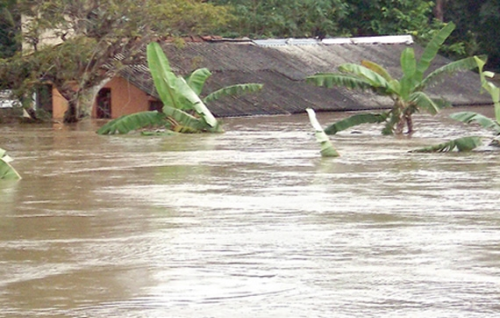
Thursday, 22 June 2017

 The dawn of the Fourth Industrial Revolution brings with the promise of further human advancement. And yet, while humanity should be aspiring for a better life, disturbing events like the terrorist attacks in Manchester, London, and the Philippines, and the recent white phosphorus attack in Raqqa, Syria, point to humanity’s burial of its own journey toward a better world.
The dawn of the Fourth Industrial Revolution brings with the promise of further human advancement. And yet, while humanity should be aspiring for a better life, disturbing events like the terrorist attacks in Manchester, London, and the Philippines, and the recent white phosphorus attack in Raqqa, Syria, point to humanity’s burial of its own journey toward a better world.The 17th century philosopher Pascal rightly explained, “Humanity is great, because it knows itself to be wretched.” Is there then, with advance human intellect, still hope of creating a better world and preventing or minimising the loss of human life? Machiavelli (The Prince, Chapter III) has said, “It is necessary not only to pay attention to immediate crisis, but to foresee those that will come and to make every effort to prevent them.”
In Sri Lanka, this year, over 200 lives were lost and half a million affected from the torrential rainfall that caused floods and landslides; it was the same cycle of rain with a different magnitude than last year. The nation’s vulnerability to such natural disasters in the near future and years ahead should be taken into highest consideration. The attitude of a reactive response to crisis situations should change.
A proactive methodology designed to minimise casualties should be considered. When asked about the vision for 2050, the 100 ministries within Sri Lanka and the newly created ones, indicate vagueness and uncertainty.
Sri Lanka’s future will depend on the choices that are created today for a better tomorrow. For this, it is important to question the reference template used to make such choices – is it outdated or still a relevant template? For example, in the last budget, the Sri Lankan government increased taxes of electric vehicles.
However, at the UNFCCC COP 21 in Paris, the President pledged to the sustainability project, followed by supporting remarks by the Prime Minister in New York. This is a relevant template. The question then is how to bridge the gaps in policymaking?
Sri Lanka could play a significant role in the next few decades due to pivotal geo-strategic positioning. Therefore, it is very important to identify and discuss the national challenges for the next 25 to 50 years, and even beyond. Demographic shifts, urbanisation, population ratios and the challenges that Sri Lanka could face from within and from outside powers are some salients to be considered.
For this there is a need to prepare foresight maps for the nation, its institutions and ministries for a long-term 50 year time horizon and with correct methodology, so that the nation can be easily steered from regime to regime and mandates could be identified in a scientific method. This does not happen in Sri Lanka at present.
In Sri Lanka, ministries have been connected and the Government claims that this has been done scientifically. For instance, Education and Highways have been clubbed; similarly, Finance and Media have been clubbed. There is no connection among the subject areas of these ‘scientifically’ clubbed ministries. Additionally, the ministries› mandates are spread in an ad hoc manner. Sometimes they overlap or duplicate the process. When institutes are created or reset this way, they lose their strategic direction and focus.
It appears that the quality of governance has been replaced by quantity. In a country, the grand strategy is spelled out by its leaders and the strategy has to be adjusted justifiably to accommodate changes in the context. If it cannot be justified, the government should not create new entities that will burden its budget and could even derail the grand vision.
As per to the Millennium Project, “The decision support software and foresight systems are constantly improving: for example, big data analytics, simulations, collective intelligence systems, indexes and e-governance participatory systems.” Integrating foresight systems to a society is a priority and many governments have already included it years ago. In 2016, the Sri Lanka Foresight Initiative was launched by this author with the Millennium Project which operates in over 60 countries to improve policymaking and strategic narrative on key priority areas by engaging government and all others in important stakeholders in the society.
Unfortunately since its launch in May 2016, till now there has not been a single inquiry or request to implement this methodology. The powerful Delphi platform that is used has benefited many countries and the Sri Lankan Millennium Node could visit ministries and institutes and assist and train the officers to develop the foresight map.
According to futurist Dr. Puruesh Chaudhary who operates the Pakistan node for Millennium Project, “Futures thinking facilitate the process of institutionalised decisions amongst the leadership corridors improving learning faculty and increases the quality of policy inputs and strategic outcomes.” She eloquently explains the importance of inculcating future study to government policy making in her latest book ‹The Big Idea: Next Generation of Leadership in Pakistan needs a ‹New-Think’.
For a country like Sri Lanka which aspires to be the ‘Miracle’ or ‘Wonder of Asia’, its leaders should craft the foresight map that takes the country to the aspired destination.
[Views expressed here are personal and do not reflect those of the Government of Sri Lanka or the Institute of National Security Studies (INSS). Asanga Abeyagoonasekera is a visiting lecturer at Colombo University and the Director General of INSSSL the National Security think tank of Sri Lanka, this article was initially published by the IPCS, New Delhi for ‘Dateline Colombo’ http://www.ipcs.org/article/south-asia/crisis-and-foresight-analysis-5302.html.]
